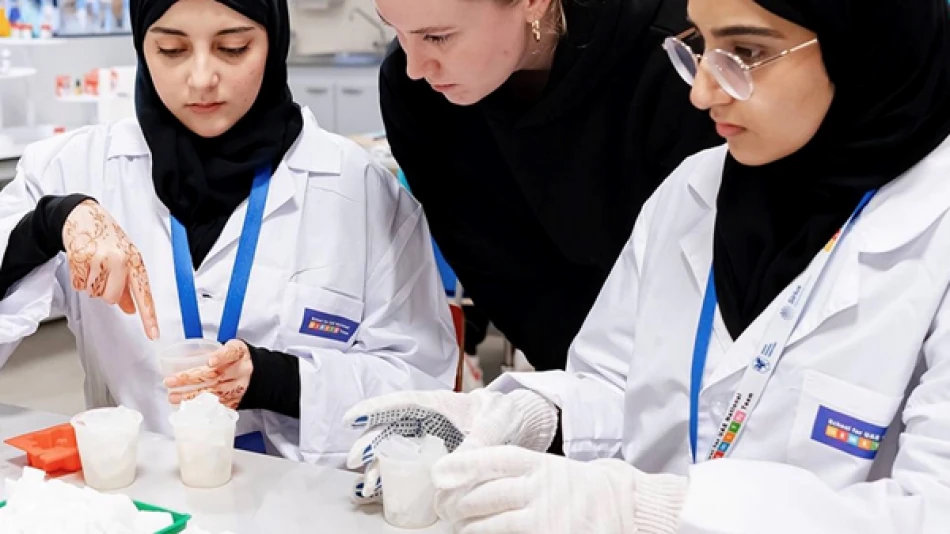
UAE Equips Teachers with 110 Specialized Training Workshops Ahead of New Academic Year
UAE Launches Comprehensive Teacher Training Blitz Ahead of New Academic Year
The UAE Ministry of Education is rolling out an intensive five-day professional development program for teachers starting August 18, targeting both public and private school educators ahead of the 2025-2026 academic year launch on August 25. The ambitious initiative features 110 workshops across 21 training centers, signaling the Emirates' continued push to modernize its education sector and maintain its competitive edge in the Gulf region.
Digital-First Approach Reflects Regional Education Trends
The training program emphasizes digital integration and cybersecurity—areas where the UAE has been positioning itself as a regional leader. Key focus areas include mastering the "Alef" educational platform, digital teaching tools, and cybersecurity strategies for safe learning environments. This aligns with the UAE's broader National Strategy for Advanced Innovation, which aims to make the country among the most innovative nations globally by 2031.
The hybrid delivery model, combining in-person sessions with interactive online workshops through the Learning Curve platform, mirrors successful approaches adopted by Singapore and South Korea in their education digitization efforts. Unlike many countries that rushed into digital learning during the pandemic, the UAE appears to be taking a more systematic approach to teacher preparation.
Comprehensive Subject Coverage Reveals Curriculum Priorities
Mathematics and STEM Take Center Stage
With 14 workshops dedicated to mathematics alone, the program reflects the UAE's emphasis on STEM education as part of its economic diversification strategy. The focus on computational thinking, creative design, and innovation workshops suggests alignment with the country's goal to build a knowledge-based economy less dependent on oil revenues.
Language Education Expansion
The inclusion of 13 English workshops alongside dedicated sessions for French and Spanish instruction indicates the UAE's commitment to multilingual education—a strategic advantage as the country positions itself as a global business hub connecting East and West.
Strategic Timing and Scale Signal Serious Investment
The timing of this massive training initiative, just one week before the academic year begins, demonstrates the UAE's willingness to invest significantly in teacher preparation. The program's scale—involving educators from all seven emirates across 21 training centers—represents a coordinated national effort rarely seen in the region.
The Ministry's requirement for mathematics teachers to bring laptops for hands-on application training suggests a practical, implementation-focused approach rather than theoretical workshops. This attention to detail could prove crucial for successful technology integration in classrooms.
Regional Implications and Competitive Positioning
This initiative positions the UAE ahead of regional competitors in education quality. While Saudi Arabia has been investing heavily in education through Vision 2030, and Qatar continues to leverage its Education City model, the UAE's systematic approach to teacher professional development could provide a sustainable competitive advantage.
The emphasis on "comprehensive teaching strategies" and "global best practices" suggests the UAE is benchmarking against international standards rather than regional ones—a approach that could pay dividends as the country competes for international students and educational partnerships.
Implementation Challenges and Success Factors
The success of this ambitious program will likely depend on teacher engagement and the quality of follow-up support throughout the academic year. The Ministry's emphasis on "unifying visions between educational and administrative bodies" suggests recognition that systemic change requires coordination beyond individual teacher training.
The integration of cybersecurity training is particularly noteworthy, addressing a critical gap that many education systems have overlooked. As cyber threats to educational institutions increase globally, this proactive approach could become a model for other nations.
With the UAE hosting COP28 and continuing to position itself as a global hub for innovation and sustainability, the success of this education initiative will be closely watched by international observers as an indicator of the country's long-term competitiveness in the knowledge economy.
Most Viewed News

 Layla Al Mansoori
Layla Al Mansoori






